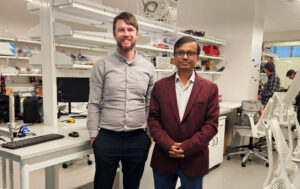Fulbright research partnership at Florida Poly developing sensors to improve Parkinson’s patient care

LAKELAND, Fla. – Advanced research at Florida Polytechnic University, in collaboration with the University of Windsor in Canada, is centered on the development of wearable sensors to assist in care for those diagnosed with Parkinson’s disease.
Patients with Parkinson’s disease often contend with progressive stiffness, tremors and balance problems that can make movements such as walking, standing and even eating a challenge.
Dr. Chris Kelley, assistant professor of mechanical engineering at Florida Poly, and Dr. Jalal Ahamed, associate professor at UWindsor’s Department of Mechanical, Automotive and Materials Engineering, are focusing on capturing changes in the gait of a person with Parkinson’s disease.
“We are building a wearable system that will have the capability of capturing information for motor function, motor dysfunction and motor movement that can be used in Parkinson’s disease management and care,” said Ahamed, a Fulbright Canada research chair collaborating at Florida Poly this fall.
To gather the information, the wearable system combines multiple sensor data to accurately capture movement and ground reaction force during walking or standing to detect any freezes or abnormalities in gait movement. At the center of the sensing system is a microelectromechanical systems-based inertial sensor that can accurately detect movement in all directions. The coin-sized sensing system powered with wireless connectivity will be clipped to each shoe of a user. Its small size, lower cost and high accuracy is expected to provide ease, accessibility and comfort of use.
“We want to extract from the data what level of dysfunction that patient is having in terms of stability, shuffling and freezing of gait and to what extent can we quantify that observation to monitor disease progression and how effective treatments are,” Kelley said. “If we can accurately capture those symptoms and at the same time use similar methods to measure upper-limb symptoms like bradykinesia and tremor for different subtypes of the disease, we can have more objective measures.”
Kelley, who separately received a National Science Foundation grant this spring to research control theory and Parkinson’s disease, said the detailed data captured by the wearable technology will offer a significant new tool to physicians who currently rely on subjective observation for many of their diagnosis and treatment decisions.
The team has designed and manufactured the sensor system and is solidifying a long-term collaboration between their institutions. Once ready, Ahamed will work to assess its accuracy in comparison with the larger, more expensive existing systems regarded as the gold-standard that require patients to travel to special facilities for similar measurements. Meanwhile, Kelley will recruit patients to begin testing its effectiveness in earnest.
“This is going to be a cost-effective way to monitor gait objectively and couple it effectively with Parkinson’s disease modeling to improve treatment,” Kelley said.
Ahamed and Kelley are now writing a journal paper about their research.
For the most recent University news, visit Florida Poly News.